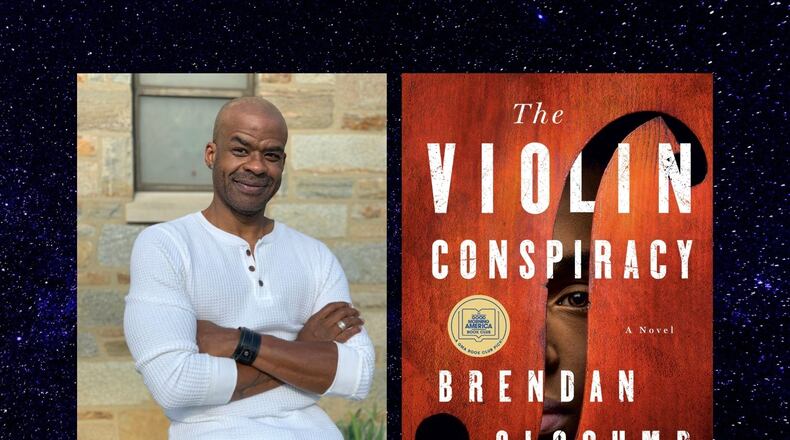“The Violin Conspiracy” by debut author Brendan Slocumb is a suspenseful literary journey chronicling a Black violinist’s experience climbing the ranks of the predominantly white world of classical music. Zeroing in on the roles society often expects Black people to assume, and the struggles that ensue when they defy preconceived notions, Slocumb weaves together a provocative narrative of hope and perseverance taut with verve and intrigue.
Rayquan “Ray” McMillan is one month away from the most important violin competition of his life — the classical-music equivalent of “American Idol” meets the Olympics — when he opens the case of his $10 million Stradivarius to discover a Chuck Taylor shoe and ransom demand for $5 million.
Panicked, Ray retraces his steps from his home in Charlotte, North Carolina, to the last place he saw his violin: a New York City hotel room. The FBI and insurance investigators launch an international search to determine who stole his Stradivarius and how to get it back. The clock is ticking. Ray is traveling to Moscow in four weeks to perform in the prestigious Tchaikovsky competition and cannot win without his violin.
Slocumb, a violinist, educator and conductor, drew from his own struggles as a musician of color while composing “Violin Conspiracy.” Gifting Ray with the grit and determination it took Slocumb to infiltrate the “aristocratic club” of classical music, he substantiates the burden of modern-day racism by highlighting his real-life experiences.
Countless times, be it from a client or police officer or orchestra conductor, Ray is subjected to unconscionable instances of suppression triggered by the color of his skin. They serve as his constant reminder that “no matter how nice the suit, no matter how educated his speech or how strong the handshake … no matter how friendly or how smart he was, none of it mattered at all. He was just a Black person,” who had to work twice as hard and be twice as good.
While the urgent investigation unfolds, Slocumb takes the reader back in time to reveal the story of how Ray came to possess his irreplaceable violin. It’s so much more than an instrument, so much more than the key to winning first place. It’s “in his blood, in the pulse that beat in his wrists and temples.” It’s the anchor to his past.
The Stradivarius belonged to Ray’s fourth great-grandfather, PopPop, who took it with him when he left the Georgia plantation where he was enslaved. Playing the fiddle is how PopPop was able to survive the horrors of slavery and endeared himself to his slaveowner. Tucked away in an attic for generations, moldy and covered in filth, the fiddle was given to Ray by his Grandma Nora, the one person in his family who believed in him. The gift of the fiddle, along with her encouragement, gave an awkward and solitary boy the courage to fight for his future.
When PopPop’s fiddle is determined to be a rare 18th century Stradivarius, one of only 245 made by Antionio Stradivari still in existence, Ray finds himself in the center of a media frenzy and is launched into the spotlight. With the help of his devoted mentor, Dr. Janice Stevens, his career as a soloist takes off. Although deep inside, Ray believes the fascination surrounding him is rooted in people wanting “to watch him make an idiot of himself on the stage: he knew he was just a curiosity, something to tell their friends about later.”
The violin’s value invites problems into Ray’s life. Seeing it as their meal ticket, his family wants to sell it and split the proceeds. The descendants of the slaveowner claim the violin was stolen by PopPop and have embroiled Ray in a vicious lawsuit to reclaim possession. They’re all suspected in the theft, but whoever took it is covering their tracks remarkably well. And at the center sits Ray, a man who just wants to play his PopPop’s fiddle to make his grandma proud.
With the Strad gone, Ray is forced to borrow a subpar violin and throw himself into practicing for the competition on a foreign instrument. “All those extra hours of practice, they build themselves into the marrow of your bones, they electrify the nerve endings on the tips of your fingers, until they become habit. Now his bones were prickling and his fingertips were tingling, and even though picking up this unfamiliar instrument was the very last thing he ever wanted to do, he did it.”
Discipline isn’t the only mechanism Slocumb utilizes to convey the depth of Ray’s passion for his violin. His flowing, vivid language lifts the music off the page and brings the listening experience to life. Performing a solo with a symphony, Ray contextualizes the sound, describing it as “a wave pouring endlessly up a beach, the foam bubbles kicking in, the stone crabs dancing in the surf” until, tension ratchetting, “the surf crept higher, past the beach, onto the dunes, roaring like a tsunami toward houses sleeping under the moon, unaware of what was pounding toward them.”
The friction in the narrative grows more fraught when Ray departs for the Tchaikovsky competition, accompanied by Dr. Stevens and his girlfriend, Nicole, without his prized violin. If only the slaveholder’s entitled descendants would quit throwing wrenches in his path. If only the investigators could find his PopPop’s fiddle. If only he could focus on the music he loves to play instead of worrying about crowdfunding the ransom demand.
“Violin Conspiracy” takes the reader on a musical journey ripe with passion and intrigue. Slocumb’s cogent narrative explores time-worn themes with a fresh and powerful voice.
FICTION
“The Violin Conspiracy”
by Brendan Slocumb
Anchor Books
352 pages, $28
About the Author
Keep Reading
The Latest
Featured


